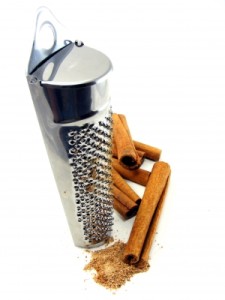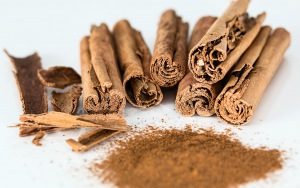
In ancient days, cinnamon more valuable than gold. Gold was in abundant supply, while cinnamon was not widely available. Traders had learned how cinnamon could tastily enhance the flavor of any dish and were eager to carry the aromatic spice back home. Cinnamon’s aroma derives from cinnamonaldehyde, an essential oil found in the bark of cinnamon trees. Known in Sanskrit as twak, in Hindi as dalchini, and in Gujarati as taj, cinnamon has a long history of use in Ayurvedic home remedies.
While cinnamon is very flavorful and aromatic, it also has numerous health benefits. Both Ayurveda and traditional Chinese medicine have utilized this health promoting spice to treat colds, diabetes, indigestion, and high cholesterol.
Before you stock up on cinnamon sticks or powder, make sure that you’re getting the best quality. While there are four main types of cinnamon, the primary ones which are sold are Cassia cinnamon and Ceylon cinnamon. The majority of this spice that’s available in grocery stores is the lesser expensive variety, Cassia cinnamon. It is darker and less sweet than the true Ceylon cinnamon, and its sticks are harder. Cassia cinnamon can’t be easily ground into a powder. The Ceylon variety which imparts the health benefits, while cassia cinnamon contains large doses of the compound coumarin. Couramin can cause certain unwanted side effects, such as increased heart rate and liver and kidney problems. Plants such as parsley, celery, chamomile, and sweet clover also contain couramin.
 The various species of the cinnamon tree are native to India, Sri Lanka, Indonesia, Ceylon, and Burma. As one of the world’s oldest spices, cinnamon is grown in Egypt, Brazil and the Caribbean.
The various species of the cinnamon tree are native to India, Sri Lanka, Indonesia, Ceylon, and Burma. As one of the world’s oldest spices, cinnamon is grown in Egypt, Brazil and the Caribbean.
In Ayurvedic terms, cinnamon pacifies Vata and Kapha doshas, but it may aggravate Pitta dosha if taken in excess. It has a sweet, pungent, and bitter rasa or initial taste, it is heating, and has a pungent vipak or aftertaste. To learn your current Ayurvedic doshic balance, take this free quiz.
Cinnamon improves digestion and absorption, and promotes elimination. It removes toxins from the body, and improves circulation by strengthening the heart and warming the kidneys. As a blood thinner, cinnamon prevents heart attacks. Additionally, cinnamon may be used in the treatment of respiratory and sinus congestion, bronchitis, colds, and the flu. It is both an expectorant and a decongestant.
HOME REMEDIES USING CINNAMON
Here are some common Ayurvedic home remedies for cinnamon:
- To reduce the Kapha provoking properties of rice and other carbohydrates, add cinnamon to the dish.
- For a common cold, cough or congestion, combine ½ tsp cinnamon and 1 tsp of raw, uncooked honey and take two or three times a day.
- For coughs, colds, and sore throats, boil cinnamon sticks in water and inhale the vapor.
- For a sinus headache, make a paste of ½ tsp cinnamon powder and water and apply topically.
- For diarrhea, combine ½ tsp of cinnamon powder, a pinch of nutmeg. and ½ cup yogurt and consume this combination two to three times daily.
- For lowering LDL cholesterol, take ½ tsp of cinnamon daily.
- Use a cinnamon flavored toothpaste, or mouthwash to naturally add cinnamon into your system.

A great health benefit of cinnamon is its effectiveness in regulating blood sugar. One of the initial studies was published in the journal Diabetes Care published in 2003. Sixty people with type 2 diabetes consumed 1, 3, or 6 grams of cinnamon daily (equivalent to ¼ – 1 tsp) as a pill daily. After forty days, all three amounts of cinnamon lowered the subjects’ fasting blood glucose levels by 18 – 29%, their LDL cholesterol (the bad cholesterol) by 7 – 27%, overall cholesterol by 12 – 26%, and their triglycerides by 23 – 30%.
The Journal of Diabetic Medicine published a research study in which the subjects who took cinnamon supplements showed greater improvement in their blood glucose levels as compared to those subjects who took the regular diabetes medications.
Copenhagen University conducted a study with arthritis patients and administered them ½ tsp of cinnamon powder with 1 tbsp of raw honey every morning before breakfast. These patients experienced noticeable reduction in their pain after a week and they were able to ambulate pain-free within a month.
Kansas State University researchers discovered that cinnamon fights the E. coli bacteria in unpasteurized juices. Studies have found that it has antibacterial as well as anti-fungal properties. It’s active against Candida albicans, the fungus responsible for thrush and yeast infections, and Helicobacter pylori, the bacteria which causes stomach ulcers. The U.S. Department of Agriculture in Maryland published a study showing how cinnamon reduced the proliferation of leukemia and lymphoma cancer cells.
 Despite the numerous health benefits of cinnamon, people who are on diabetes medication or any medication that affects blood glucose or insulin levels shouldn’t take large doses of this spice without medical supervision. Combining these two may cause blood glucose levels to fall too low.
Despite the numerous health benefits of cinnamon, people who are on diabetes medication or any medication that affects blood glucose or insulin levels shouldn’t take large doses of this spice without medical supervision. Combining these two may cause blood glucose levels to fall too low.
Cinnamon essential oil should never be applied directly to the skin. Small quantities of the diluted oil may be used to fight infection but using the oil alone can cause great burning and irritation to exposed skin.
People with pre-existing digestive disorders, such as IBS or ulcers should consume small amounts of cinnamon. Taking more than ½ tsp may irritate the lining of the stomach. Please contact your health care professional before beginning any herbal regimen and do not discontinue and prescribed medication without prior medical approval.
In small doses, cinnamon can enhance the taste and aroma of your coffee, tea, rice dishes, soups, and vegetable dishes. Whether in stick or in powder form, cinnamon is sure to spice up your life!